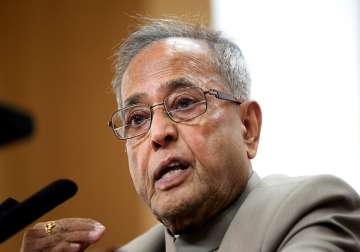EU Debt Crisis, US Slowdown Impacting India : Pranab
New Delhi, Oct 22: Debt crisis in Europe and slowdown in the US are having an adverse impact on India, but the fundamentals of the country's economy remain intact, Finance Minister Pranab Mukherjee said today.Addressing

New Delhi, Oct 22: Debt crisis in Europe and slowdown in the US are having an adverse impact on India, but the fundamentals of the country's economy remain intact, Finance Minister Pranab Mukherjee said today.
Addressing the National Development Council (NDC) meeting here, he said “while there may be some moderation in growth in the current fiscal, the fundamentals of the economy are intact and the medium-term growth prospects remain buoyant”.
However, Mukherjee said as the country has become increasingly globalised, it means that “when the world sneezes, India runs risk of catching a cold.
“Not surprisingly, the economic crisis in Europe and the slowdown in the US are impacting us adversely”.
Indian economy, which recorded a growth rate of 8.5 per cent in 2010-11, is expected to moderate to about 8 per cent during the current fiscal. In the April-June period of 2011-12 the growth slipped to 7.7 per cent, slowest in six quarters.
Mukherjee further said that unlike in 2008-09, the government doesn't have an elbow room for economic stimulus as it committed towards fiscal consolidation.
In the Budget 2011-12 the government has envisaged a fiscal consolidation path and aims to bring down fiscal deficit to 4.6 per cent of GDP in the current fiscal.
“As Finance Minister, I stand committed to this path of fiscal consolidation,” Mukherjee said adding “The quality of expenditure and its multiplier effect on growth must get our attention”.
The Prime Minister, senior central cabinet ministers and most of the chief ministers are attending the NDC meet, which is considering the blueprint or Approach Paper for the 12th Five Year Plan (2012-17).
Mukherjee said renewed uncertainty in the global economy, weak business sentiment and persisting high inflation at home pose considerable challenges to the task of making the Plan.
The Approach Paper outlines two alternative economic growth scenarios - 9 per cent and 9.5 per cent.
While finances of states have been improving steadily in the recent years, Mukherjee said that an area of concern which they need to address relates to tax revenues.
States' tax to GSDP ratios show wide variations. In 2008-09, the average tax to GSDP ratio was 6.7 per cent. The top two states had tax to GSDP ratios of 9 per cent and 8 per cent and the bottom two, 4.1 per cent and 4.2 per cent.
“These ratios point towards the need for more work by many States to rationalise tax rates, improve compliance and widen the tax base,” Mukherjee said.
On the Direct Tax Code (which will replace the Income Tax Act, 1961), he expressed the hope that Parliamentary Standing Committee will submit its report by the Winter Session and said the government would seek to get the legislation passed during the Budget session.
On the proposed Goods and Services Tax (GST), for which a Constitutional Amendment Bill has been introduced in Parliament, Mukherjee sort support of all political parties.
“I seek full cooperation of the states in supporting this Constitutional Amendment Bill to pave the way for the early introduction of GST,” he added.
He further said the number of centrally sponsored schemes needs to be rationalised.
There has been some progress on this front over the years but there is scope for much more streamlining of these schemes, he added.